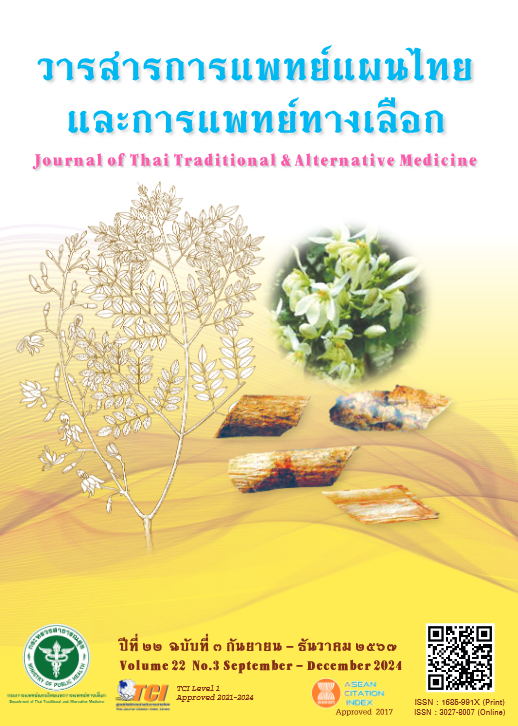A Survey of Knowledge and Opinions on Cannabis Use among People in Mueang Chiang Mai District
Main Article Content
Abstract
Introduction and objective: The policy of decriminalizing cannabis from being classified as a Category 5 narcotic may widely spread its use for both medical and recreational purposes. However, the readiness of Thai citizens, especially knowledge of the clinical benefits, risks, and laws and regulations of cannabis, has not been widely studied. This study’s objective is to investigate the knowledge and opinions of Thai citizens who live in Mueang Chiang Mai regarding cannabis use, benefits, risks, and related laws and regulations.
Methods: A cross-sectional survey study was conducted among Thai citizens aged 20 years or above who lived in Mueang Chiang Mai. A survey questionnaire was developed and validated, and then distributed to subjects using both paper-based questionnaire and online through a Google form. The questionnaire consisted of three parts, including 1) general information, 2) knowledge related to cannabis, and 3) opinions towards cannabis. Descriptive statistics were used to analyze data.
Results: A total of 329 respondents participated in the survey, with 225 females (68.39%); and most of them were 20–29 years old (47.35%). Overall, the knowledge score (on a scale 0–20) related to cannabis was moderate (14.80 ± 2.39). Average scores for general information about cannabis, benefits of cannabis, risk of cannabis, and laws and regulations related to cannabis were 3.89 ± 0.73, 3.24 ± 1.38, 3.98 ± 1.12, and 3.68 ± 0.85, respectively. Participants’ opinions indicated that cannabis should be only used for medical purposes under supervision of health professionals (4.20 ± 0.77). In addition, participants revealed that current cannabis commercials and advertisements might misinform the public (4.07 ± 0.85). Moreover, participants’ opinions showed that household cannabis planting should be restricted (4.03 ± 0.85). The least agreed-upon issues from participants were that individuals aged <18 years should be allowed to use cannabis (2.88 ± 1.15), patients with chronic conditions should be allowed to use cannabis (3.06 ± 0.81), and cannabis could be used for recreation (3.18 ± 0.97).
Discussion: The knowledge and opinions on cannabis use among people in the area remain at a moderate level, which does not align with the increasing number of cannabis shops. In addition implementing regulatory measures to control cannabis use by relevant agencies, such as the Ministry of Public Health, should be made to prevent and strengthen social immunity among the public.
Conclusion: This study demonstrates that knowledge related to cannabis among the people in Mueang district, Chiang Mai province, is at a moderate level in terms of general information, benefits, harms, and laws related to cannabis. Additionally, the people of Chiang Mai province believe that the use of cannabis for medical treatment should be under the supervision of healthcare professionals. Advertising media creates misunderstandings about cannabis, and there should be a limit on the number of cannabis plants cultivated per household.
Article Details

This work is licensed under a Creative Commons Attribution-NonCommercial-NoDerivatives 4.0 International License.
References
Ministry of Public Health. Ministry of Public Health Announcement, Subject: Specification of Narcotic Drugs in Category 5 B.E.2565. Nonthaburi, Thailand: Ministry of Public Health; 2022 p. 33 (in Thai).
Boontae S. Survey Project on Attitudes and Behaviors Regarding Drug Use: A Case Study of People Aged 18 - 65 in 20 Provinces Across All Regions of the Country. Final report (Bangkok), Centre for Addiction Studies (CADS); 2022. Report No.:64-00223-0041 (104). (in Thai).
Ramathibodi poison center. Information on cases of injuries from cannabis reported to the Ramathibodi Poison Center during June 9-15, 2022 (7 days from the legalization of cannabis. [Internet].2022 [cited 2023 Oct 29]; Available from: https://www.rama.mahidol.ac.th/poisoncenter/th/news/event/07jun2022-1448-th (in Thai).
Saijanket P, Nojan P, Meekai N, Suknarin R. Knowledge and attitude about Medical Cannabis among People in Phitsanulok Province. J Thai Trad Alt Med. 2020;18(3):595-603. (in Thai).
Chiang Mai Provincial Public Health Office. The mid-year population from 2003 to 2021 in Chaing Mai Province, Thailand. Chiang Mai: Chiang Mai Provincial Public Health Office [Internet]. 2022 [cited 2023 Oct 29]; Available from: https://www.chiangmaihealth.go.th/all_it.php (in Thai)
Kitpreedaborisut B. Research guide: Writing research reports and theses. Bangkok, Thailand: Department of Education, Faculty of Social Sciences and Humanities, Mahidol University; 2010 (in Thai).
Noisri S. Information seeking behavior, uses, and gratifications of information about cannabis for medical uses of consumers (thesis). Bangkok: Chulalongkorn University; 2022. (in Thai).
Paisitpiriy S, Nonthanathorn P. Knowledge, attitude and practice towards cannabis use among people in northeast metropolitan. J Assoc Res. 2021;26(2):33-51.
Narcotics Control Division, Food and Drug Administration, Ministry of Public Health. Information searching system for cannabis licenses [Internet] 2024 [cited 2024 Jan 20]; Available from: https://hempfdamophgoth/FDA_MARIJUANA/STAFF/MARIJUANA_REPORT_PUBLIC_MAP.
Weerachai V, Patarakorn A, Lakkhanaphichonchat L, Chucharoen P, Thongpanich C, Wittayanookulluk A, Chompookham P, Rukngan W, Renuwattananon A, Chanpreecha D, Aphabutsayaphan R, Jaipatum W, Tokaeo R, Makan S, Nilban S, Nakhayothinsakul Y, Tueakkaew S, Khantee R, Lohakit S, Chaipochitphan N, Singto T. Drugs and addictive substances In: Makornsarn C, editor Thailand Medical Services Profile 2011 – 2014. Nonthaburi, Department of Medical Services, Ministry of Public Health; 2014. p.9(1)–9(56). (in Thai).
Office of the Narcotics Control Board: Ministry of Justice. Nationwide drug enforcement results, Office of the Narcotics Control Board: Annual report 2564 B.E. Bangkok, Thailand: Office of the Narcotics Control Board: Ministry of Justice; 2021.


